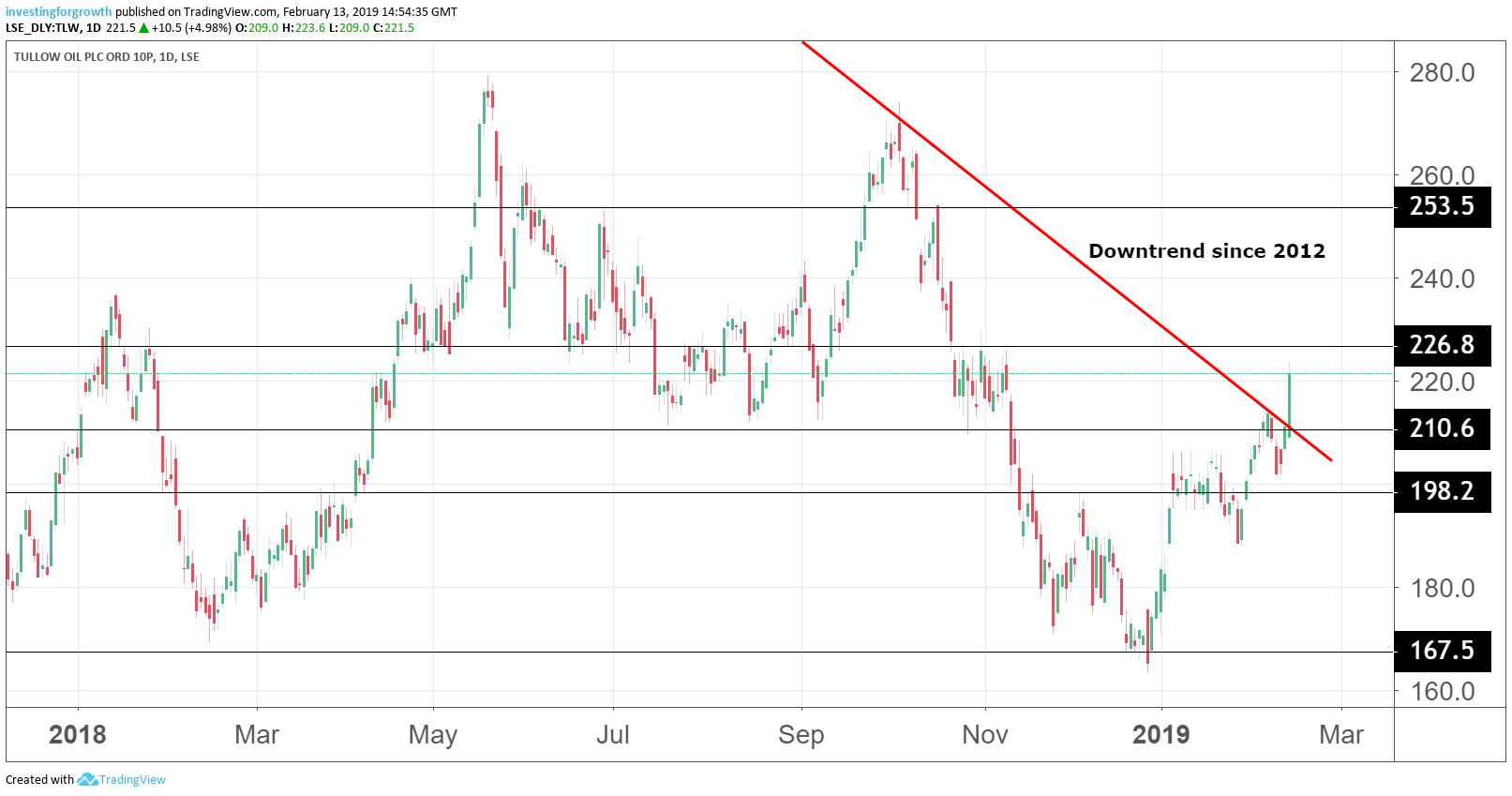Tullow Oil is flying after return to dividend list
Rallying to a three-month high, Tullow is profitable and rewarding shareholders with income and growth.
13th February 2019 15:16
by Graeme Evans from interactive investor
Rallying to a three-month high, Tullow is profitable and rewarding shareholders with income and growth.

With a first dividend in almost five years, Tullow Oil (LSE:TLW) today broke free from the balance sheet shackles that have restrained shares ever since the 2014 slump in crude oil prices.
Analysts at Davy believe that Tullow's 2018 performance — highlighted in annual results today — is likely to be seen as a "watershed" for the Africa-focused company, having also posted net profits for the first time since 2014 with a surplus of US$85 million.
Davy said that Tullow's self-help efforts of recent years allied to stable production and a friendlier oil price had steadied the group. This should provide the platform to return to a more active exploration drilling programme, they predicted.
Today's dividend return is slightly earlier than expected, given that the company told investors at November's Capital Markets Day of its intention to start a capital returns policy from the 2019 financial year onwards.
The policy promises that future ordinary dividends will be no less than $100 million and split one-third to two-thirds between the interim and final pay-out. In periods of particularly strong free cash flows, Tullow will consider additional returns to shareholders.
But with cash of $411 million generated in 2018, the company was able to recommend a final dividend of 4.8 cents per share today, representing a total shareholder return of about $67 million.

Source: TradingView (*) Past performance is not a guide to future performance
As deleveraging remains a priority and with net debt still above $3 billion, JP Morgan Cazenove said it was not strictly necessary to restore dividend payments in today's results. However, they said the more stable oil price environment seen at the start of 2019 and greater progress in Uganda justified the pay-out.
They noted that a tax deal with the Uganda government was the other positive in today's results as this had been preventing completion of a $900 million farm-down to Total and Cnooc.
Shares rose 4% to 219p following today's results, having been as low as 165p in December. A string of discovery successes in Africa helped the stock to peak at 1,300p in 2012, but the company was caught out by the slide in oil prices from 2014 onwards. Debt spiralled to $4.8 billion in 2016, with shares stuck in a narrow range ever since.
Analyst forecasts suggest some caution going forward, with the price targets of UBS and Barclays at 200p and 225p respectively. JP Morgan Cazenove is more optimistic at 292p.
The group was set up by Aidan Heavey in 1986 with a licence agreement in Senegal. It now has interests in over 80 exploration and production licences across 16 countries. These are managed in three divisions covering West Africa, East Africa and new ventures.
Chief executive Paul McDade said the company now had a "solid foundation" based on high-margin producing assets in West Africa, its substantial development assets in East Africa and exploration licences in industry hotspots.
He added: "Tullow has worked hard over the past few years to become a self-funding, cash-generating business with a robust balance sheet, low-cost assets and a rigorous focus on cost and capital discipline."
*Horizontal lines on charts represent levels of previous technical support and resistance. Trendlines are marked in red.
These articles are provided for information purposes only. Occasionally, an opinion about whether to buy or sell a specific investment may be provided by third parties. The content is not intended to be a personal recommendation to buy or sell any financial instrument or product, or to adopt any investment strategy as it is not provided based on an assessment of your investing knowledge and experience, your financial situation or your investment objectives. The value of your investments, and the income derived from them, may go down as well as up. You may not get back all the money that you invest. The investments referred to in this article may not be suitable for all investors, and if in doubt, an investor should seek advice from a qualified investment adviser.
Full performance can be found on the company or index summary page on the interactive investor website. Simply click on the company's or index name highlighted in the article.